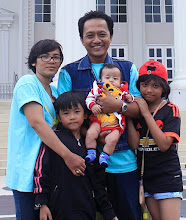Have you been felt so.. so.. angry? I guess everybody does, but was it the right angry? Being the right angry is to be angry in the right time, right place, with the right person, using the right speech and keeping your voice tone. So that the person you are angry with, will not hate you, or even get mad. If you are a Boss, and your employee has done a mistake that gets you so angry, then you should be angry with his work, and not personally angry with him.
It's best for us to learn to control our anger! Feels angry and moody is controlled by our emotion. We should manage to control our emotional first. If not, stress will block our way to be angry, the right angry. That makes you get emotionally angry. So, What is emotion is all about?
Emotion, mental states, or processes accompanied by marked bodily reactions, which occur to anticipate, or to realize the satisfaction, or frustration of needs. In Latin, emotion originally meant an inner turbulence, as in a storm cloud, which discharged its forces outward.
The earliest writings about these feelings of pleasantness, or unpleasantness, probably are in the Sanskrit literature. The Vedas (3000-1500 BC) and the Upanishads (800-500 BC) contain descriptions of pleasure, pain and sexual enjoyment. Emotions were called passions
by early Greek writers, such as Aristotle. Mentalistic philosophers of the 18th and 19th centuries were considered emotions to be mental experiences, and later became thing of the mind.
Theories of Emotion
Theory I:
Emotion is an indivisible mind-body reaction. Many authors disagree with the 1st theory.
Theory II:
Emotion is a mental event which depends upon other bodily events. Walter B. Cannon concluded that emotion resulted from the brain structures (the diencephalon, which includes the thalamus and hypothalamus). While for William James, emotion was a mental event dependant upon physiological event.
Theory III:
Emotion is a bodily event which may produce mental events. Carl G. Lange, a Danish physiologist, considered emotion was a bodily event which might, or might not produce mental events. But Knight Dunlap, US psychologist, claimed emotion as the dynamic background of all behavior
Behavior Patterns in Children
John B. Watson believed there were 3 primary emotions which are fear (elicited by loud noise or loss of support), anger (elicited by interference with activity), and lust/love (elicited by mild tactual stimulation of erogenous zones). He believed that all emotional life developed from these 3 behavior patterns.
Watson also describes 8 behavior patterns in infants that may be regarded as distinct emotional changes:
- Startle (fear), to sudden intense stimulation.
- Struggle (anger), to interference with movement.
- Muscular arrest-tumescence (sexual excitement), to sustained gentle stimulation of the skin.
- Exaggrerated withdrawal (pain), to sudden pain-producing stimuli.
- General activity (excitement), to susutained unpleasant internal sensations.
- Quiescence (pleasure of relief), to relief from unpleasant stimulation.
- Spitting-mouth aversion (disgust or revulsion), to unpleasant tastes.
- Exhaustion-whimpering (disappointment or grief), to persisting and unrelieved unpleasant stimulation.
If those above patterns of behavior are discrete in human infants, they would be relatively discrete in adults. Nina Bull has demonstrated differences in muscular attitude among some of these commonly accepted emotions, and many experimenters are attempting to determine precise differences in autonomic, and endocrine responses to stressful situations.
Sources:
- John B. Watson, Psychology from the Standpoint of a Behaviorist (1919).
- Carl G. Lange, and William James, The Emotions (1922).
- Walter B. Cannon, Bodily Changes in Pain, Hunger, Fear and Rage (1929).
- H. M. Gardiner, and others, Feeling and Emotions: A History of Theories (1937).
- Nina Bull, The Attitude Theory of Emotion (1951).
- H. F. Dunbar, Emotions and Bodily Changes (1954).
- M. A. Wenger, and others, Physiological Psychology (1956).
- M. B. Arnold, Emotion and Personality, Vol. I (1960).
- P. T. Young, Motivation and Emotion (1961).
- Encyclopedia International by M. A. Wenger, University of California.



























No comments:
Post a Comment
Please read the comment policy before commenting!